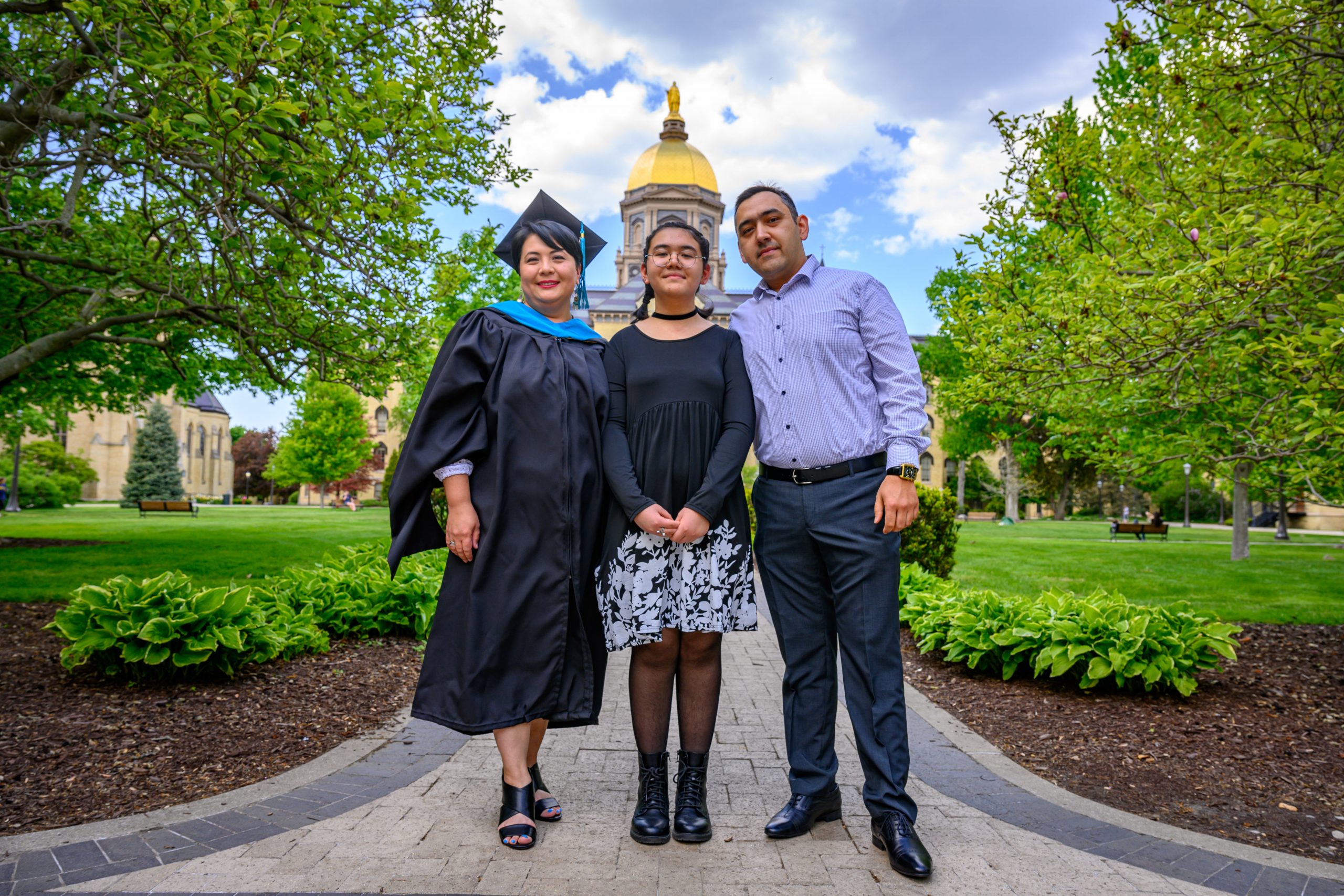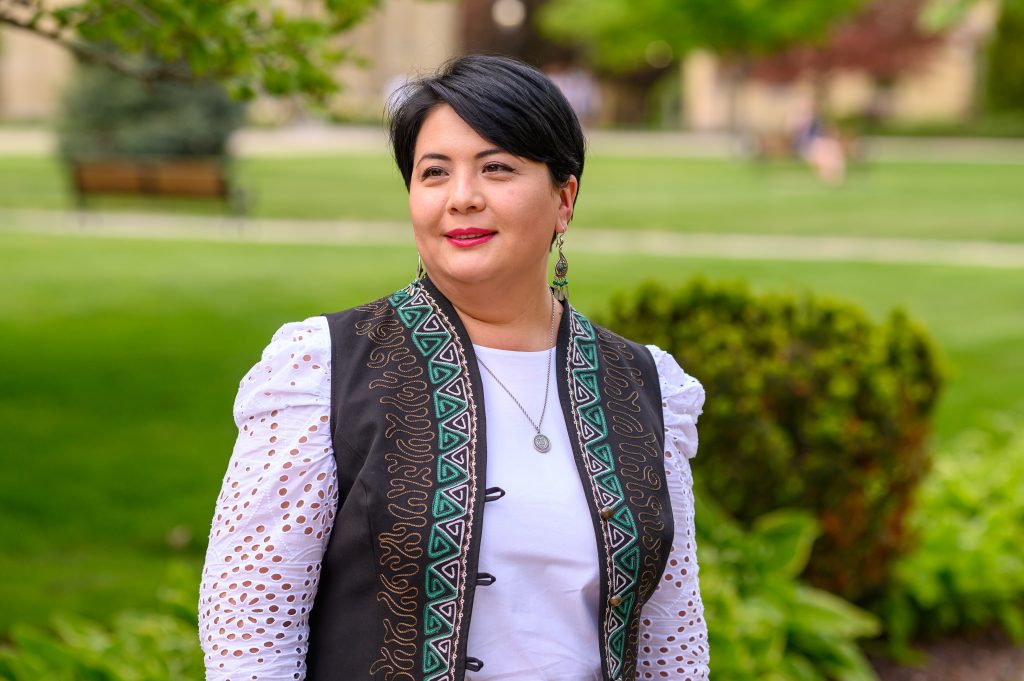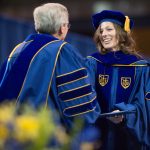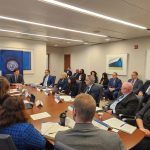It’s rare for a leading humanitarian organization to hire a newly minted master’s graduate. But that’s exactly what happened when Gulzeyin Khalibaeva MGA ’21 was offered a full-time position with Catholic Relief Services (CRS). In fact, Khalibaeva began working for CRS two months before she graduated from Notre Dame with a master of global affairs degree. Now Khalibaeva’s supervisor at CRS, Lucy Steinitz, says Khalibaeva is the best hire she’s ever made.
“Gulzeyin is hard-working, enthusiastic, super-efficient, and very smart,” said Steinitz, a senior technical advisor for protection and equity at CRS. “And on top of that, she comes with great education in peacebuilding, international relations, governance, protection, and research.”
As a technical associate for the CRS Program in Justice & Peacebuilding, Khalibaeva provides technical support for the program’s peacebuilding and protection operations worldwide. In this role, she ensures that field officers and partner staff members have access to content-rich capacity-building resources online.
Khalibaeva recently spoke with the Keough School about her work with CRS and how the Master of Global Affairs program prepared her for this role.
Q: How did you land your position at Catholic Relief Services?
A: Through the master of global affairs concentration in international peace studies I had a six-month internship with CRS. It was an amazing opportunity that was virtual because of the pandemic. Half of my work was in design, monitoring, and evaluation–my passion—and the other half focused on peacebuilding—my dream. It was my first exposure to CRS and I fell in love with the team. Before I came to Notre Dame I worked in many places and had more than fifteen years of experience in different organizations. At CRS, my supervisors were supportive and were true mentors. Even online, I was able to build relationships with staff members in the field and my unit members, which I appreciated because I’ve always been a “people person.”
Q: What are your primary responsibilities?
A: Now that I work for CRS headquarters I am seen as a support person. During this time when many of us are working virtually, CRS still prioritizes continuing their operations in the field. I contribute to a series of virtual learning events aimed at building capacity among staff and partner members, with special focus on mental health. I find the focus on mental health to be so timely, especially during this pandemic period of global uncertainty. Currently I use a statistical and narrative approach to analyze CRS’s engagement of older adults, both as “givers of wisdom” and as vulnerable citizens with high rates of illness and disability.
Q: What do you enjoy about your work?
A: I have learned so much from my supervisor and team. I appreciate their constant desire and dedication to make their work better, more efficient, and more productive for the benefit of the most vulnerable. I am also delighted to be part of a team of people who work for a better tomorrow. In learning from them, I have become a better version of myself. I have learned about the cultures of several new-to-me countries and established a professional network of dedicated individuals in Europe, Africa, Asia, and Latin America. I am Muslim, and at the beginning I had doubts about joining a Catholic organization, but CRS employs people from many different faith traditions and backgrounds who work together in harmony and constantly learn from each other. I love that.
Q: What new insights about peacebuilding have you gained?
A: The pandemic brought to light some aspects of peacebuilding that need to be addressed immediately. For example, over the past thirty years the whole peacebuilding sector has highlighted the necessity of localizing peacebuilding. Then in 2020, when countries went into lockdown and expats were evacuated, it was local staff members and partners who did the work. I have learned how important it is to support the frontline peacebuilders in an accessible way. Moving the capacity-building programs online and making them accessible is just a partial solution—CRS staff members and partners also need access to stable internet connections and devices. There is a lot of work that needs to be done to effectively localize peacebuilding and the pandemic has sped up that process. Finding opportunities amid crises is a skill that I learned in my Peacebuilding Practice course at the Keough School, and at CRS I witnessed how the crisis was managed and also used to bolster peacebuilding operations.

Q: What skills and knowledge from the MGA program have proven most helpful to you professionally?
A: More than half of my studies took place during the pandemic. I appreciated the support, care, and knowledge shared by Keough School faculty and staff during this time of global crisis. My peace studies courses—Peacebuilding Practice; Strategic Peacebuilding; Peace, Violence and Development; helped me form my identity as a peacebuilder and I also gained capacity-building knowledge and skills that I now use at CRS. I learned a lot from the courses that focused on “hard skills,” especially Data Visualization with Matthew Sisk. I was able to perfect my technical skills in presenting data and studies in effective ways. Being an international student, I learned a lot from writing skills coordinator Stephanie Perrin, who helped us express ourselves in writing in the most effective way possible. And on the career development side, Melinda Fountain and Erik Oswald helped us refine our professional portfolios for the job market.
I took two excellent courses in migration studies, one taught by Erin Corcoran and one taught by former Keough School faculty member Denis McDonough, who now serves as US Secretary for Veterans Affairs. These two classes helped me focus professionally on work that helps migrants, refugees, and asylum seekers. This is important to me personally because in 2010 I had to leave my own home country of Kyrgyzstan. Because of interethnic violence and the ethnicity of my husband, we had to flee to Russia. In Russia we were targets of everyday racism and xenophobia, and as a result I am passionate about human rights and issues faced by migrants from Central Asia.
Q: How did you hear about the Keough School and what drew you to the MGA program at Notre Dame?
A: My number one objective was to find a job I believed in at a well-respected organization. I have achieved that—having a master’s degree from a prominent university has opened doors. I appreciate that the Keough School supports students who do not have financial resources to pursue graduate studies. The Keough School’s Kroc Institute for International Peace Studies has a long history of supporting people from Kyrgyzstan, so I knew many people who have graduated from Notre Dame over the years. As an MGA student I had classmates from all over the world and we had a very tight-knit cohort–it was one of the program’s biggest benefits.
Q: What advice do you have for students who are interested in applying to the Master of Global Affairs program?
A: Do not be afraid of applying. You’ll receive so much support for your research and growth as a professional. Ask yourself the question “Why do I need this master’s degree? What will I do with it?” Come up with a clear answer and a clear objective. You’ll find wonderful resources to support you, and people to guide you. Everyone here at the Keough School wants you to succeed. I saw it, I experienced it, and I am very grateful for that.



